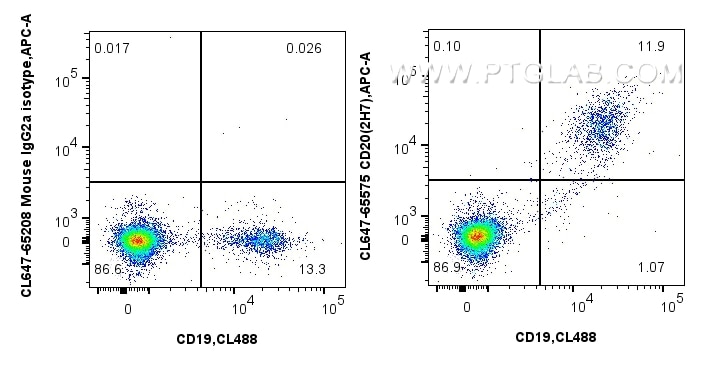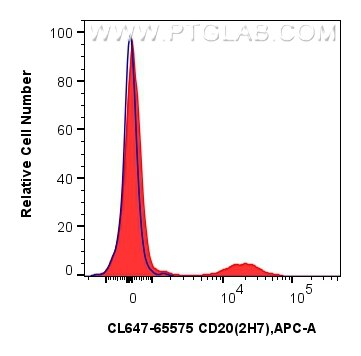Tested Applications
| Positive FC detected in | human PBMCs |
Recommended dilution
| Application | Dilution |
|---|---|
| Flow Cytometry (FC) | FC : 5 ul per 10^6 cells in 100 μl suspension |
| This reagent has been pre-titrated and tested for flow cytometric analysis. The suggested use of this reagent is 5 µl per 10^6 cells in a 100 µl suspension or 5 µl per 100 µl of whole blood. | |
| Sample-dependent, Check data in validation data gallery. | |
Product Information
CL647-65575 targets CD20 in FC applications and shows reactivity with human samples.
| Tested Reactivity | human |
| Host / Isotype | Mouse / IgG2a |
| Class | Recombinant |
| Type | Antibody |
| Immunogen | Human tonsillar B cells Predict reactive species |
| Full Name | membrane-spanning 4-domains, subfamily A, member 1 |
| Calculated Molecular Weight | 297 aa, 33 kDa |
| GenBank Accession Number | BC002807 |
| Gene Symbol | CD20 |
| Gene ID (NCBI) | 931 |
| RRID | AB_3673627 |
| Conjugate | CoraLite® Plus 647 Fluorescent Dye |
| Excitation/Emission Maxima Wavelengths | 654 nm / 674 nm |
| Form | Liquid |
| Purification Method | Protein A purification |
| UNIPROT ID | P11836-1 |
| Storage Buffer | PBS with 0.09% sodium azide and 0.5% BSA, pH 7.3. |
| Storage Conditions | Store at 2-8°C. Avoid exposure to light. Stable for one year after shipment. |
Background Information
CD20 is a 33-37 kDa transmembrane phosphoprotein belonging to the membrane-spanning 4A family (PMID: 3260267; 16785532). CD20 is a B-lymphocyte surface molecule that is widely expressed during B-cell ontogeny, from early pre-B-cell developmental stages until final differentiation into plasma cells (PMID: 7524522). CD20 functions as calcium-permeable cation channel (PMID: 7684739). It is involved in the regulation of B-cell activation, proliferation and differentiation (PMID: 7524522).
Protocols
| Product Specific Protocols | |
|---|---|
| FC protocol for CL Plus 647 CD20 antibody CL647-65575 | Download protocol |
| Standard Protocols | |
|---|---|
| Click here to view our Standard Protocols |





